- Home
- Lloyd Jones
See How They Run
See How They Run Read online
Contents
Title Page
Dedication
Introduction
See How They Run
I
II
III
IV
V
VI
VII
Third Branch of the Mabinogion:
Afterword
Acknowledgements
Advertisements
Copyright
Er cof am Iona Evans (1965-1989)
New Stories from the Mabinogion
Introduction
Some stories, it seems, just keep on going. Whatever you do to them, the words are still whispered abroad, a whistle in the reeds, a bird’s song in your ear.
Every culture has its myths; many share ingredients with each other. Stir the pot, retell the tale and you draw out something new, a new flavour, a new meaning maybe. There’s no one right version. Perhaps it’s because myths were a way of describing our place in the world, of putting people and their search for meaning in a bigger picture that they linger in our imagination.
The eleven stories of the Mabinogion (‘story of youth’) are diverse native Welsh tales taken from two medieval manuscripts. But their roots go back hundreds of years, through written fragments and the unwritten, storytelling tradition. They were first collected under this title, and translated into English, in the nineteenth century.
The Mabinogion brings us Celtic mythology, Arthurian romance, and a history of the Island of Britain seen through the eyes of medieval Wales – but tells tales that stretch way beyond the boundaries of contemporary Wales, just as the ‘Welsh’ part of this island once did: Welsh was once spoken as far north as Edinburgh. In one tale, the gigantic Bendigeidfran wears the crown of London, and his severed head is buried there, facing France, to protect the land from invaders.
There is enchantment and shape-shifting, conflict, peacemaking, love, betrayal. A wife conjured out of flowers is punished for unfaithfulness by being turned into an owl, Arthur and his knights chase a magical wild boar and its piglets from Ireland across south Wales to Cornwall, a prince changes places with the king of the underworld for a year...
Many of these myths are familiar in Wales, and some have filtered through into the wider British tradition, but others are little known beyond the Welsh border. In this series of New Stories from the Mabinogion the old tales are at the heart of the new, to be enjoyed wherever they are read.
Each author has chosen a story to reinvent and retell for their own reasons and in their own way: creating fresh, contemporary tales that speak to us as much of the world we know now as of times long gone.
Penny Thomas, series editor
See How They Run
I
He sat at his desk and felt really great. For the first time in ages: on top of his game. A strong surge of happiness had swept through him all morning; he felt clean, alert, and completely in control.
Good news had arrived in a steady trickle, as it does sometimes in life, and he felt really up for it. He enjoyed fresh starts, physically as well as mentally. They happened so seldom – they were rare and special. Anything was possible.
Today, on a Monday morning in spring, in his room overlooking the town, he studied his computer screen. He’d already changed the background to a shot he’d taken himself – a sheaf of young daffodils in the college grounds. Fresh start, fresh picture. Crisp and clear. It was almost religious the way he went about it; he could have been a hermit sweeping his cell on Christmas Eve, with a sprig of holly above the holy rood, his stone floor sprinkled with a dusting of fresh, windblown snow.
He fetched a hard drive from a low drawer to his right, and after connecting it he filed away every single document and folder on the desktop, clearing the screen. Next he rearranged all the icons in a neat triple line on the left; then he played about with his recycle bin, before deciding to leave it in the bottom left hand corner. The space to the right of the daffs was completely clear; when he leaned back in his chair to study the effect he felt a fresh surge of pleasure. A bright yellow light of optimism cheered the room. And outside, a neon sky. He’d studied it through his classical ogee window – a vast vault of blue, seemingly higher and broader than he’d ever seen it before. Looking out over the landscape he’d seen no movement at all, as if every single human had been transported somewhere else, leaving a virgin landscape. He tried to imagine the scene before modern history: a wide open country full of silence and measureless, limitless time. It was easier to imagine the deep past with a sad wind moaning outside. Using his imagination he could erase all the buildings below and travel swiftly backwards. That’s why history had attracted him as a boy: as the wind saddened in the eaves of their rural cottage he had wondered about those lost, mysterious people toiling in their raw landscapes; he had been intrigued by their forgotten tombs and their uncontrollable myths. Back in the present he toyed with the idea of binning the games folder, but he liked a quick bout of Solitaire or Mahjong Titans before he started, to limber up, so he stayed his hand.
There! He had a pristine desktop, and he went a step further, clearing his large pine desk of everything except for his fruit bowl and his regulation family photo, plus a new notebook and a new biro. He played about with their appearance on the desk, nudging each item in different directions until everything looked just right. Minimalistic and tidy. It was like being a god, rearranging the world. He was Zeus with a half-eaten apple in one hand and a mouse in the other, stooped over his computer, viewing the world within the screen, quietly planning, conniving, pushing his little playthings this way or that. He liked the image; he’d just finished a paper on the old Celtic gods, whose names no one knew, and his head was still full of them.
After storing the hard drive he rubbed his hand dry of apple juice and right-clicked a new folder into existence. It was neat the way he could do that. Sublime, creative. He labelled it Notes and filed away his first document, a memo from his head of department:
From: Professor M. Williams
To: all deans, faculty heads, everyone in the history department
Dr Llwyd McNamara has received a bursary to help him prepare a biography of the great rugby player Big M, and as a consequence he will take a term’s sabbatical to research his project. Dr Fflur Ceiriog will take his lectures pro tem and I will take his seminars. I’m sure we all wish him well, and I look forward to reading more about this Welsh icon. An overview of the Irish tragedy is long overdue.
For years, Llwyd had used his unusual Christian name as a chat-up device during the seduction process, but since it was unpronounceable to most of the students, especially the large Chinese contingent who clogged his local Morrisons every term, he’d been secretly glad when the departmental secretary mutated it, though he felt she might have consulted him first.
So he became Lou to all except the small Welsh community at the college. Even his wife mocked him with it, gently and ironically. The Tibetans, she said, gave each child a new name if it survived a major illness. Was she implying something?
He’d never known why he had a Welsh forename. It was the only hint he’d been given regarding his paternity; his ma had refused steadfastly to tell him any more. He’d been born at a time when the only special relationship had been the bond between all the Celtic countries, and not between a bunch of bent Americo-British politicians and their business cronies.
Llwyd meant pale and suggested a pasty, nerdy type. Even worse, it hinted at a furtive, malicious plotter, an Iago figure.
Lou positioned his new folder in the top right-hand corner and wondered if it looked right there, a small yellow bird in a big blue sky. Maybe he could customise it, and he toyed with the idea of phoning IT, but realised he wasn’t sure what
he wanted. A different colour maybe? He’d leave it for now. Perhaps one day there would be a whole department at the uni studying nothing else but computer iconography – a branch of semiotics, presumably. He’d like that, he was intrigued by symbols.
Next, he created another folder and labelled it Ireland. After moving it about with his mouse he finally positioned it directly below Notes. It was so agreeable, the way a folder glided into place when it was released by the mouse.
Finally, before starting on his fresh, daffodil-smelling project, he phoned Catrin to check up on her – because they’d both clicked another folder into being about three months previously; his partner was pregnant, and she was preparing that very day to set off to her parents’ home in the hills to inform them. It was going to be an exciting year, he could feel it in his marrow.
He celebrated with three straight clearances among the Mahjong Titans.
And yet something wasn’t quite right. After winning his games he sat for a while, looking at the flatish bank of cumulus clouds he’d caught with his camera, above the daffodils, now frozen on his screen. He got up and went back to the window, finding another bank of clouds, lighter and longer, rumpled pillows drifting eastwards across the real horizon. In the doll-within-doll world of his computer the clouds had no emotional density; yet over there in the sky, moving very slowly in the far distance, they imparted a sensuous, supernatural otherness, a stratospheric mysticism; high in the blue above him they seemed to drift on the invisible winds of time, a fantastical convoy. He imagined the old deities sitting on their thrones of ether, drifting towards the edge of the world and the fringes of human comprehension. The clouds could also be seen as huge ships, Leviathan trawlers crawling with their engines merely ticking over, dredging the land; their cumulus shadows were long dark nets thrown out to gather the homesteads, animals, spinneys and churches below.
Lou considered the worlds within worlds around him: he himself had been hatched inside his grandmother, as an egg within his embryonic mother; now his genetic future was growing silently within Catrin, as a tiny cloud might form and gather at dawn below the sea’s far horizon.
On his desktop lay a document within a folder within a computer within a room within a college within a nation, and so on ad infinitum – but almost everything he’d created so far had lain within the confines of academia. Confines. If he wanted to research this book properly he would have to leave the safety of his academic atoll, relinquish the beautiful digital shimmer inside the coral depths of his computer. He would have to step out into the real universe. The one with rain and death, not pretty icons and cursory games. Farewell to FreeCell and Mahjong Titans. Most of all he’d miss the pattern of books – a blow-up of scholarship’s dusty butterfly wings – covering the entire wall to his right. Like the cloud-shadows dredging the landscape outside, his books had trapped him between the webbing of their printed lines and hauled him along the scholastic seabed. He’d been caught, hook, line and sinker.
By the end of the day, with Lou’s customary efficiency, all the arrangements had been made. Ireland beckoned again. He hadn’t been there for ages, not since his mother’s funeral. This time he would call on another woman, whom he’d never met. He was slightly nervous about it. Lou had little experience of duplicity, but that’s what he had in mind. Perfectly formed in his brain, like a cluster of anthers in one of his pixellated daffs, lay a series of acts which would bring him recognition and fame.
The train to Holyhead wasn’t too bad, crowded but merry. Manly rolls of laughter, banter, heavy fried breakfasts still sludging through the pipes. But the ferry was packed, as you’d expect on a six nations weekend, and the close physical foreplay got on his nerves after a while so he went up alone on deck. He was with the usual college crowd, knowledgeable and experienced. They knew all about the game’s mad frottage, its frothing convulsions; each scrum a huge spider silking its golden egg. And the three quarters all strung out, a line of fencing posts, wired in between with the blurred memory of a hundred thousand ancestral passes. Rugby was a war game to them, paintball with a pint in your hand. Up aloft in a nippy little wind he cowered in the lee of a stack and observed the glassy sea. He was having a problem with scale; his mind flickered to and fro. Here was hugeness, but all he could see was a miniature ferry crossing the screen of his computer, crossing a puddle by the daffs. Suddenly, he felt tiny. What did it mean: was he empathising with his embryonic baby, swimming in its own little ocean? Or merely responding to the overpowering bulk of the mob around him? Who cared...
He shrank into his anorak and let his mind rove. He had always loved the sea, always felt completely at home either in it or on it. It was in his blood somewhere; maybe his forebears, his mother’s kin, had been fishermen. Men like Tomas O’Crohan from the Great Blasket Island, who’d started every sentence with yerra or wisha. And didn’t his surname have something to do with the sea? Didn’t it mean son of the hound of the sea? The McNamaras had been warriors, apparently, building over fifty castles in Clare alone. Lou hadn’t acquired the fighting gene but he was a fantastically good non-competitive swimmer, nicknamed Sealboy at school. And surely he was a true Piscean, never knowing whether to swim with the tide or against it.
The sea. Even today, standing above a holdful of semi-drunken urbanites at play, it was easy to imagine the Celtic world of prehistory; a seemingly endless body of water with distant shifts of light, soundless squalls at the furthest limits of seeing. A time when there was no land beyond the horizon, only water stretching to infinity. The world had been packaged and sold in lots since then; to the modern mind it was measured by the number of films you could see on a flight to New York; but once upon a time it was counted out in cubits and oar-lengths, and measured by the number of water-skins aboard a boat full of marauding psychopaths filling in their days between pillage and death. Dots on the faraway sea, the people of the old world were scarce and brave. What silence there must have been. And everyone a pilgrim. Just a few people, but a superabundance of ghosts and demons and spirits. Ship-devouring serpents and the hideous kraken. Mermaids and sirens. Every horizon was a knife edge, the rim of the cosmos.
It was all a matter of scale. But some things had remained the same. Mankind hadn’t changed that much, only his playthings. Religion and superstition still abounded. Lou was a great toucher of wood and chucker of salt himself, he was as superstitious as the next man. Of course, his intellect had overridden all that stuff many years previously, but he still carried on with the rites. His superstition was nominal, he knew that; it was as virtual as the icons on his desktop, representing yet more representations.
Here he was again, alone on the planks of a boat. His ma had told him so many tall stories, he had no idea how many were true; her darling son was unique, she’d told him countless times at bedtime, tickling him and nuzzling her warm laughter into his neck, he was the only boy ever to be made and born on a boat in the middle of the ocean. So said his lovely freckly ma. His dancing-around-the-room ma, zany and boisterous, not the serious one who took him to church, or the ma who looked at his school report for far too long. Made and born at sea? Later, when he understood such things, he’d taken this to mean that he’d been conceived and delivered into the world on the Irish ferry, which wasn’t as bonkers as it sounded, since she’d worked for Sealink as a stewardess. Broom cupboard love? Well, he’d never know now. As for his own love life, it had never been better. Catrin had bloomed during pregnancy and she was extra sexy all the time; he too had felt constantly aroused when he was anywhere near her. Completely normal, said the doctor. Now that Catrin was up the duff, all restraint had gone. You lucky sod, said the doctor’s eyes. Hazel eyes, like his ma.
He was joined on deck for a while by a pretty young thing in a fluffy Welsh dragon hat, armed to the teeth with tits and legs. She stood close to him in the diesel afterbreath of the engines, having a fag, and he felt a tug; his own rampant sexuality, ringing him in confident waves, had obviously reached her. H
e thought briefly about making a move but then she walked over to the rails and retched into the churning foam below. Charming, thought Lou, though he still unpeeled her banana-skin jeans with his eyes and ran his mind along her thighs.
Still completely and anomalousy sober when they docked at Dun Laoghaire, he detached himself from his group, saying he’d see them later at the pub as arranged. They knew he had business.
The cab driver looked surprised and slightly pissed off when he said Dalkley, please. Too close maybe? How could a man make a daysent penny? So the taximan took his time getting there, giving Lou a lingering view of Joyce’s Martello tower. Soon they’d reached the town and Lou imagined Flann O’Brien’s drunken weave along the pavement, Finbarr the King of Dalkey robed and respendent in Finnegan’s, enjoying the craic with Maeve Binchy, Bono and Enya, talking about fame and pilchards.
Lou had the address, somewhere grand on the Sorrento Heights, in his notepad and he pushed it through the gap between the seats. Christ, how much would a place like that put you back, said the driver when they got there. You want me to wait, surr? His mock-respect was delivered with such panache that Lou replied why not?
His face must have shown surprise when she opened the door, but she didn’t seem to notice. What had he expected? An academic widow in early middle age, slim, intelligent eyes, mouth of a madrigal singer? All the old platitudes? But she wasn’t the wife he’d expected, clearly. She was the mother, as it turned out, a dowager queen from one of the old Irish dynasties, freshly risen from a phantom levee, her mirthless grey eyes stripping him bare in moments. She was tall and straight, in a long black dress with a lace collar and cuffs, so ancient it could have hung in the V&A. She was Queen Medbh of Connacht at the ford, ready to gird Fergus for his bull raid. Or a brogue Miss Havisham maybe, severe and insane, trapped for ever in a huge decaying mansion, her clock stopped at the moment her son died. But far from being cobwebbed and dusty, the room in which they sat at opposite ends of a massive dining table was immaculate and set ready for a banquet: starched linen, gleaming glassware.

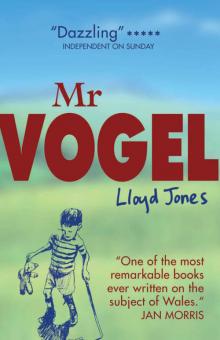 Mr Vogel
Mr Vogel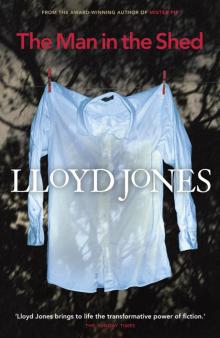 The Man in the Shed
The Man in the Shed Mister Pip
Mister Pip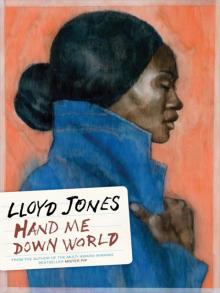 Hand Me Down World
Hand Me Down World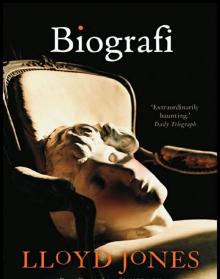 Biografi
Biografi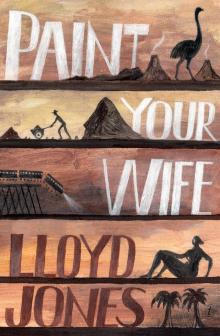 Paint Your Wife
Paint Your Wife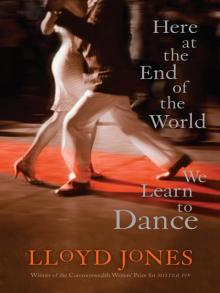 Here at the End of the World We Learn to Dance
Here at the End of the World We Learn to Dance My First Colouring Book
My First Colouring Book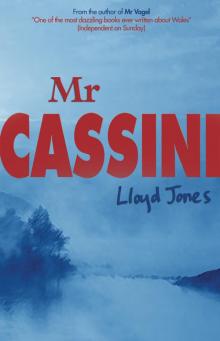 Mr Cassini
Mr Cassini See How They Run
See How They Run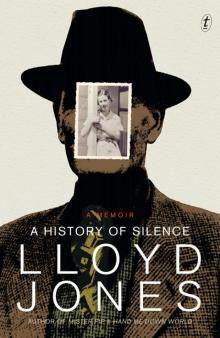 A History of Silence
A History of Silence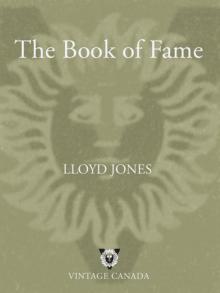 The Book of Fame
The Book of Fame